Six African Shorts
Review of African Metropolis at SIFF by Daniel G.

I’ll start right off by saying the one element of African Metropolis anyone can enjoy is that it starts off fast. There’s no fancy or a drawn out introduction sequence. That being said, the rest of the film is an utter rollercoaster. It’s actually six short 10-15 minute films, and each one is drastically different. Thus the only way to properly criticize and praise the film is to review the films individually.
The first film, "Homecoming," set in Nairobi, is the tale of a man obsessed with an engaged woman. He escapes into fantasy worlds where he saves her life, but in each daydream the man is still defeated by her fiancée. From a psychological standpoint it’s fascinating, but the poor acting and pacing make the film suffer as a whole, which is too bad because I couldn’t help but wonder if this idea could’ve been fleshed out and made this opening story more engaging in return.
The next film, titled "The Cave," is set in Cairo and tells the story of a struggling musician who travels from Alexandria for an audition to play music. The story alone feels far too long for such a simple concept. From there on out, the film loses too much steam to continue, and it feels as if the rest just isn’t sure what to do with itself. It’s a slow, drawn-out experience that made me tempted to give up on the next four entries.
Thankfully, the third film, "The Line Up," is actually fantastic, and possibly the superior film out of all six. The basic concept is that a young man living in Lagos is trying to obtain money for his hospitalized younger sister, and that idea alone hooked me the whole way through. By the end, I felt the best feature was that there’s enough questions left unanswered to keep me thinking after watching it. Though I would’ve wished for slightly more closure or explanation, it could have been so much worse. Honestly for these few minutes alone, I could recommend African Metropolis as a whole.
"The Other Woman" is very different. It’s about a wife who has to live with her husband’s new wife or girlfriend (It’s never clear what her relation is to the man). I was interested, but I just wasn’t sure why. It’s quite a confusing story, and I can’t really describe it as good or bad. But for that alone, I could say it’s worth watching.
"To Repel Ghosts" is the penultimate chapter, and tells a “variation of the last trip of Jean-Michel Basquiat.” It’s paced well and shows the troubled artist attempting to get rid of that which haunts him, but that’s all there is to the film. After that there’s no real story, which is both good and bad — good because from there it’s really just a matter of immersing yourself in the environment around Basquiat, and bad because the cost is very little story after the beginning. Either way it’s very well directed, but it lacks any substantial writing for those interested in seeing compelling character development.
Finally, "Berea" feels like an appropriate end story. The finale to these stories takes place in Johannesburg and focuses on a man who lives in isolation from everyone around him, until he meets a prostitute who unintentionally opens his world. The soundtrack is actually fantastic and sets a terrific tone all the way to the end. It’s both literally and figuratively eye-opening to both the main character and the viewer, which is something I’ve experienced very few times while watching anything. This installment along with The Line Up could quite possibly carry the other four stories.
Overall, African Metropolis is hard to judge by the sum of its parts, as each film is so diverse. Some stories do falter and others try to achieve greater standards, but in the end I wouldn’t just skip over this one. See it for yourself.
African Metropolis
Screenings June 3 and 4
Seattle International Film Festival


